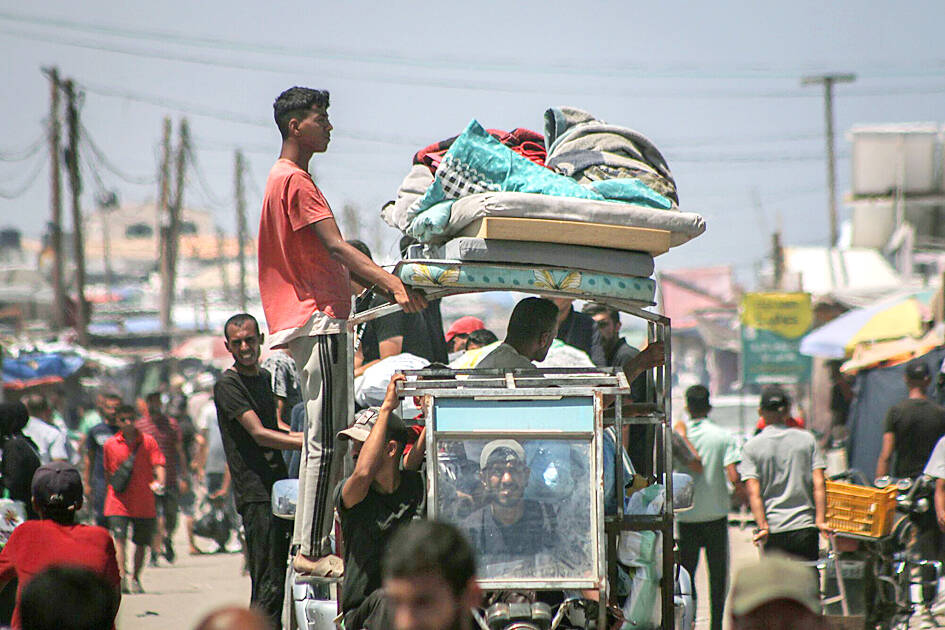The viability of a US-backed proposal to wind down the eight-month-long war in Gaza was cast into doubt yesterday after Israeli Prime Minister Benjamin Netanyahu said he would only be willing to agree to a “partial” ceasefire deal that would not end the war, comments that sparked an uproar from families of hostages held by Hamas.
In an interview broadcast late on Sunday on Israeli Channel 14, the Israeli leader said he was “prepared to make a partial deal — this is no secret — that will return to us some of the people,” referring to the roughly 120 hostages still held in the Gaza Strip.
“But we are committed to continuing the war after a pause, in order to complete the goal of eliminating Hamas. I’m not willing to give up on that,” he added.

Photo: Bloomberg
Netanyahu’s comments did not deviate dramatically from what he has said previously about his terms for a deal, but they come at a sensitive time as Israel and Hamas appear to be moving further apart over the latest ceasefire proposal.
Netanyahu’s comments stood in sharp contrast to the outlines of the deal detailed late last month by US President Joe Biden, who framed the plan as an Israeli one and which some in Israel refer to as “Netanyahu’s deal.”
The three-phased plan would bring about the release of the remaining hostages in exchange for hundreds of Palestinians imprisoned by Israel, but disputes and mistrust persist between Israel and Hamas over how the deal plays out.
Hamas has insisted it would not release the remaining hostages unless there is a permanent ceasefire and a full withdrawal of Israeli forces from Gaza.
In the interview, Netanyahu said that the current phase of fighting is ending, setting the stage for Israel to send more troops to its northern border to confront the Lebanese militant group Hezbollah, in what could open up a new war front.
However, he said that did not mean the war in Gaza was over.
Hamas said that Netanyahu’s comments represented “unmistakable confirmation of his rejection” of the US-supported deal. In a statement late on Sunday, the Palestinian militant group said his position was “in contrast” to what the US administration said that Israel had approved.
The group said that its insistence that any deal should include a permanent ceasefire and the withdrawal of all Israeli forces out of the entire Gaza Strip “was an inevitable necessity to block Netanyahu’s attempts of evasion, deception and perpetuation of aggression and the war of extermination against our people.”
Netanyahu shot back and in a statement from his office said Hamas opposed a deal.
He said Israel would not withdraw from Gaza until all 120 hostages are returned.

US President Donald Trump yesterday announced sweeping "reciprocal tariffs" on US trading partners, including a 32 percent tax on goods from Taiwan that is set to take effect on Wednesday. At a Rose Garden event, Trump declared a 10 percent baseline tax on imports from all countries, with the White House saying it would take effect on Saturday. Countries with larger trade surpluses with the US would face higher duties beginning on Wednesday, including Taiwan (32 percent), China (34 percent), Japan (24 percent), South Korea (25 percent), Vietnam (46 percent) and Thailand (36 percent). Canada and Mexico, the two largest US trading

ACTION PLAN: Taiwan would expand procurement from the US and encourage more companies to invest in the US to deepen bilateral cooperation, Lai said The government would not impose reciprocal tariffs in retaliation against US levies, President William Lai (賴清德) said yesterday, as he announced five strategies to address the issue, including pledging to increase Taiwanese companies’ investments in the US. Lai has in the past few days met with administrative and national security officials, as well as representatives from various industries, to explore countermeasures after US President Donald Trump on Wednesday last week announced a 32 percent duty on Taiwanese imports. In a video released yesterday evening, Lai said that Taiwan would not retaliate against the US with higher tariffs and Taiwanese companies’ commitments to

‘SPECIAL CHANNEL’: Taipei’s most important tasks are to stabilize industries affected by Trump’s trade tariffs and keep negotiations with Washington open, a source said National Security Council Secretary-General Joseph Wu (吳釗燮) arrived in the US for talks with US President Donald Trump’s administration, a source familiar with the matter said on Friday. Wu was leading a delegation for a meeting known as the “special channel,” the Financial Times reported earlier. It marked Trump’s first use of the channel since returning to the White House on Jan. 20. Citing a source familiar with the matter, the Financial Times reported that Minister of Foreign Affairs Lin Chia-lung (林佳龍) was also a part of the delegation. The visit came days after China concluded war games around Taiwan and amid Trump’s

CHIP EXCEPTION: An official said that an exception for Taiwanese semiconductors would have a limited effect, as most are packaged in third nations before being sold The Executive Yuan yesterday decried US President Donald Trump’s 32 percent tariff on Taiwanese goods announced hours earlier as “unfair,” saying it would lodge a representation with Washington. The Cabinet in a statement described the pledged US tariffs, expected to take effect on Wednesday next week, as “deeply unreasonable” and “highly regrettable.” Cabinet spokeswoman Michelle Lee (李慧芝) said that the government would “lodge a solemn representation” with the US Trade Representative and continue negotiating with Washington to “ensure the interests of our nation and industries.” Trump at a news conference in Washington on Wednesday announced a 10 percent baseline tariff on most goods